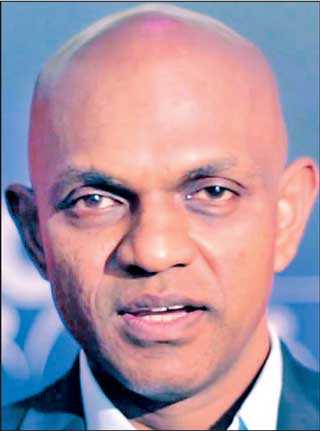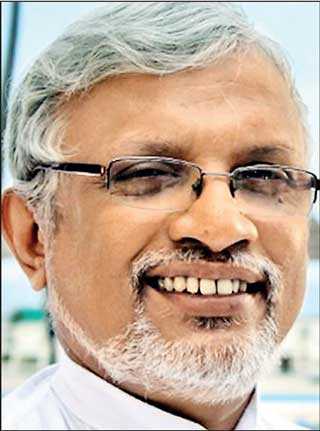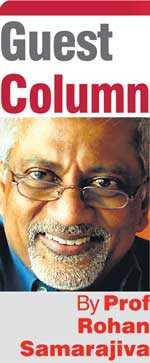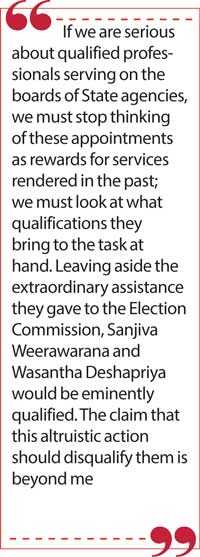Tuesday Feb 17, 2026
Tuesday Feb 17, 2026
Friday, 17 January 2020 00:10 - - {{hitsCtrl.values.hits}}
I was saddened by the criticisms of the suitability of two of the current directors of the ICT Agency Sanjiva Weerawarana, Wasantha Deshapriya to hold office because they had assisted the Election
 |
Sanjiva Weerawarana |
 |
Wasantha Deshapriya |
Commission develop its technology capabilities on the basis of a Memorandum of Understanding, duly agreed upon.
In my capacity as the then Chair of the ICT Agency I facilitated this cooperation. I served on the steering committee guiding its implementation. I knew of the Commission’s need for efficient ICT systems because I had assisted in its strategic planning in my personal capacity. Therefore, I believe I can add some light to the discussion.
Contrary to perception, ICTA does not have a cadre of software developers, architects, etc. who can be deployed on projects. To assist the Election Commission to develop its ICT capabilities, we would have had to obtain the necessary funds from Treasury, approval from the National Planning Department, procure a firm or firms to do the work using tender procedures, and so on. In light of the election timetable, this was impractical in 2018.
The Election Commission was considering an offer of volunteer assistance from the Lanka Software Foundation. I knew of its unique capabilities and values and decided to support it. It developed the Sahana disaster management software suite after the tsunami. It was spun off to the Sahana Foundation while I served as its chair. In our straitened circumstances where we had to beg Treasury for money to pay salaries, leveraging other people’s money was an option I had taken in other cases too.
In addition, we knew the flaws of the extant model. In most cases, the “owner” of the IT system fails to develop internal capacity either becoming subject to over-reliance on the vendor (vendor capture), or the systems are abandoned after a time. In the case of the earlier arrangements the Department of Elections had with universities, skills were not absorbed; every election they had to go back to the external experts. It also lacked a full architecture for the entire organisation.
The MOU between the Commission and the Foundation offered a way of working our way toward a better model, of crossing the river by feeling the stones. It brought in open-source expertise and modern architecting capabilities that the Commission lacked, while insisting that the Commission recruit technical personnel who would work side-by-side with the external team and thus develop internal capacity. ICTA provided assistance by way of access to cloud storage, SMS functionalities and quality assurance. Duly authorised ICTA staff, including myself for a short time, were present when the system was used to tally the results. 
The technical specifications were publicly accessible for comment and improvement. All key decisions were approved by the steering committee. Stakeholders were briefed about the system. Multiple trials were run. All processes were redundant in the first iteration, including hardcopy and manual calculations running in parallel. No payments were made for services. The components of the overall system deployed for the November election worked without a glitch.
The SLPP raised some questions, brought in some experts and satisfied themselves about the system. There was not even that level of engagement from Professor Marasinghe who was physically present at the Commission on the night of the count. I am surprised he is raising concerns now, after being silent before and during the election.
One Member of the Commission complained that there were too many unknown people in the building the night of the count. Apparently, he had not bothered to check with his own staff. He was informed in my presence that every single person had been duly authorised. I still have my signed entry authorisation badge. I personally experienced rigorous entry controls. The system deployment was an unconditional success. It was fair. It was transparent. It gave no benefits to any party.
It is too early to tell if this novel model of building systems and internal capacity offers the elements of a solution to the current problems with government systems. I fear that uninformed statements by responsible persons and commentators may slow it down. It is not that I am proposing that volunteer experts working for no payment is a scalable model across government. But the key point is that building software with no thought given to continuous improvement based on user needs cannot continue. We have to find new solutions. 
Now I come to the misguided allegations that have been levelled against two people gave leadership and who worked tirelessly on the system. First, I am surprised that anyone would think that being appointed to the ICTA Board is a reward. During the 20 months I served on the Board my colleagues attended 23 Board meetings, each lasting around four hours. Many also attended subcommittee meetings and strategy discussions and participated in interview panels.
About half the Members declined the sitting allowances which was symbolic anyway. Leaving aside the time spent, the work of the Board was not even pleasant. Much of it was spent untangling inherited messes, such as money given for other purposes being spent on salaries or simply finding money to meet contractual commitments. It was only in the second half of our Board’s short tenure that we were able to engage in the kind of creative work we had come to do.
Upon assuming duties, we found there was a serious gap in authoritative technological leadership in what was described as the apex ICT organisation. Lacking money and authorisation to hire at that point, we created a Digital Foresight Advisory Council and persuaded two eminently qualified tech professionals, Sanjiva Weerawarana and Sanjaya Karunasena, to serve on it. We got their time and knowledge; they got no money.
If we are serious about qualified professionals serving on the boards of State agencies, we must stop thinking of these appointments as rewards for services rendered in the past; we must look at what qualifications they bring to the task at hand. Leaving aside the extraordinary assistance they gave to the Election Commission, Sanjiva Weerawarana and Wasantha Deshapriya would be eminently qualified. The claim that this altruistic action should disqualify them is beyond me.